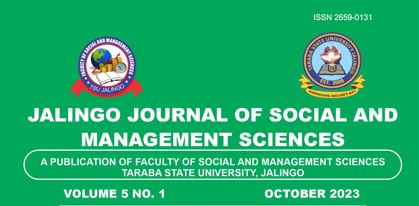Effects of Precipitation Indices on the Yield of Rice and Maize in Dadin Kowa, Yamaltu Deba LGA, Gombe State
Keywords:
Yamaltu Deba, Onset, Cessation, Length of growing season, Cumulative Rainfall ModelAbstract
This study examines the effects of precipitation indices on the yield of rice and maize in Dadin-Kowa, Yamaltu Deba Local Government Area of Gombe State, Nigeria. The study involved three (3) specific objectives; to determine the onset, cessation of rain and the length of hydrological growing season in the study area; to assess the trend in yield of rice and maize in the study area; and finally; to analyze precipitation indices and their effects on the yield of rice and maize in the study area. Seventy (70) respondents were interviewed. Rainfall data from 2000 to 2020 (21 years) was obtained from Upper Benue River Basin Development Authority, Dadin - Kowa meteorological station. The analysis using Cumulative Rainfall Model clearly demonstrated early onset of rainy season, early cessation of rainy season and extension of the length of hydrological growing season. The findings further revealed 17th April as the earliest onset date, the late cessation date is 31st October and hydrological growing season is having a mean of 146 days. Farmers make sequential decision such as planting early in response to early onset of rainy season while changing crop variety in respond to late cessation and extended length of hydrological growing season. In the case of rice production, early onset of rainy season significantly increases productivity and growth in rice production. The findings of the study revealed that the decrease in yield of maize is because of rainfall variability. The study recommends strategies for improving effective farm practices such as provision of extension services to train farmers as it relates to methods and best farm practices to boost crop yield. Services of the Dadin – Kowa dam should be prioritized and optimized, Upper Benue River basin development agency should serve more farmers with irrigation and support to cushion the effects of rainfall variability in the study area. Similarly, the study also recommends that government should consider the provision of efficient water management techniques to put in place to ensure development of farm practices.

Downloads
Published
Issue
Section
License
Copyright (c) 2023 JALINGO JOURNAL OF SOCIAL AND MANAGEMENT SCIENCES

This work is licensed under a Creative Commons Attribution-NonCommercial 4.0 International License.
